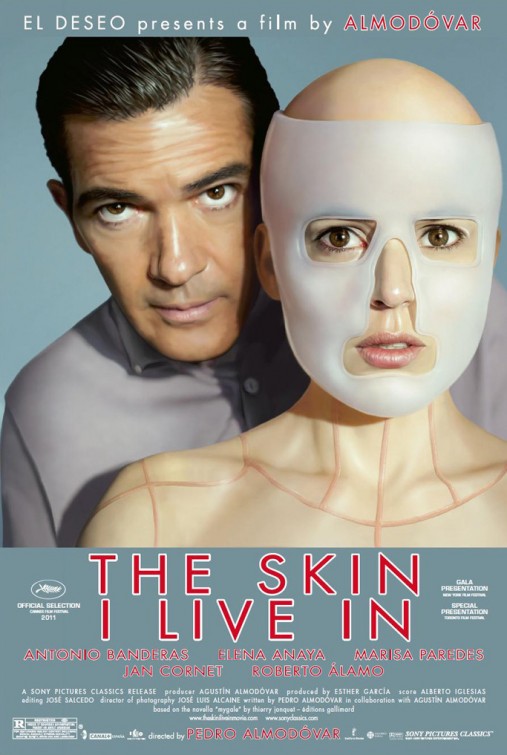La piel que habito/The Skin I Live In

The most interesting thing about Almodóvar's new film is how polarizing the reviews I read on IMDB are. It's his best film. His worst film. It's horror. It's definitely not horror. The only thing most people can agree on is the fluidity of the camerawork by Jose Luis Alcaine. In one scene, Marilia (Marisa Paredes) runs through the room at a sideways angle that confirms the urgency of the scene, in addition to being innovative and beautiful.
Perhaps this is Almodóvar's most unusual film. Oddly enough, the film takes place in the not so distant future (2012) and the not so far off past (six years ago). The comparisons to Georges Franju's Eyes Without a Face are not unjustified. Both girls, La piel's Vera and Eyes' Christiane, both wear strange and practically identical masks. Also, each film features a father that over obsesses about the well-being of his daughter who has been damaged.
However, never once did I feel that this was a horror film. It has tension and suspense; at times it is hard to watch because of the subject matter. I wouldn't be perplexed if someone thought this was a horror film, but I would describe it more along the lines of thriller and drama. The music set the mood, which wasn't as scary or kitschy as something you would expect from a horror film. It also did not go for cheap thrills.
Similarities to Almodóvar's other work pervade his film. Like in Tie Me Up! Tie Me Down!, Talk to Her, Broken Embraces, Bad Education, and Volver, there is rape. There are so many rape scenes and replayings of the rape of Norma in La piel, that one almost loses count. Yet it is strange how Vicente's rape of Norma (Blanca Suárez) could be interpreted. Her faulty last-minute "no" almost leaves you wondering if the audience is meant to sympathize with the rapist and if the victim should have protested sooner. All of this is very delicate subject matter that Almodóvar tears wide open.
The movie will be discussed in detail and there might be spoilers below:
Dr. Robert Ledgard (Antonio Banderas) plays a scientist that decides to take revenge on Vicente. He abducts him and with the help of his associates (who are none the wiser), Ledgard performs a sex-change operation on Vicente, who becomes Vera.
Vera defies her captors and tries to escape at the first chance she gets. Eventually, she becomes domiciled, almost tame. Perhaps the audience might believe she has been struck with Stockholm Syndrome when she begs to share Dr. Ledgard's room with him. But perhaps this is the reverse of Stockholm Syndrome: Dr. Ledgard hated Vicente for what he did to his daughter and kept him in a locked room. Instead of Vicente now Vera, falling in love with him, the actual captor, Dr. Ledgard, seems to be the one falling for his captive.
By the end of the film, we are faced once again with sympathizing with Vicente, the rapist, the original offender. His life has been unjustifiably transformed and he is now Vera. The audience might be left feeling uncomfortable. Dr. Ledgard took irreversible measures and now Vicente must regain his life back as Vera. Can she? Will she? Vera was as emotionally strong as Norma was not. It seems as if Vera will make a new start and move on with her life, because she has the survival instinct and refuses to let this traumatic stint in her life keep her from living.
Comments